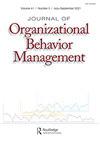虚拟现实中的行为评估:医疗保健教育中多用户模拟的评估
IF 1.2
3区 管理学
Q3 MANAGEMENT
Journal of Organizational Behavior Management
Pub Date : 2022-06-03
DOI:10.1080/01608061.2022.2084207
引用次数: 1
摘要
医学中的人为失误——医疗失误——已被确定为美国第三大死亡原因。对医疗差错导致的死亡的分析得出结论,错误的沟通在医疗差错中起着核心作用。患者交接,即将患者护理从一个医疗专业人员转移到另一个医疗专业人员,是在通信准确性至关重要的医疗保健环境中经常发生的行为事件。医疗行业从其他技术含量高、风险固有的行业(如航空业)吸取经验教训;他们创建了一个名为TeamSTEPPS®的培训包来解决医疗错误。在这些计划中,一个基本的挑战是对具体的、关键的技能进行客观的衡量。行为科学提供了客观行为测量和评估的强大历史,虚拟现实(VR)为模拟中的行为评估提供了丰富的测量平台。用VR代替真人(Direct)模拟缺乏验证研究。本研究评估了在医疗保健教育中使用VR模拟的有效性,以测量和评估由TeamSTEPPS®框架确定的医疗保健专业人员在模拟患者移交期间的关键技能。本文章由计算机程序翻译,如有差异,请以英文原文为准。
Behavioral Assessment in Virtual Reality: An Evaluation of Multi-User Simulations in Healthcare Education
ABSTRACT Human error in medicine – medical error – has been identified as the third leading cause of death within the United States. Analyses of deaths attributable to medical error conclude that faulty communication plays a central role in medical error. Patient handoffs, the transfer of patient care from one medical professional to another, are frequently occurring behavioral events in healthcare settings where communication accuracy is vital. The medical industry looks to lessons learned from other highly technical, risk-inherent industries such as aviation; they have created a training package called TeamSTEPPS® to address medical error. Among such initiatives, a fundamental challenge is the objective measurement of specific, critical skills. Behavior science offers a robust history of objective behavioral measurement and assessment, and virtual reality (VR) provides a measurement-rich platform for assessing behavior in simulations. The replacement of in-person (Direct) simulations with VR lacks validation research. The present study evaluated the validity of using VR simulations in healthcare education to measure and assess critical skills identified by the TeamSTEPPS® framework for healthcare professionals during simulated patient handoffs.
求助全文
通过发布文献求助,成功后即可免费获取论文全文。
去求助
来源期刊
CiteScore
2.70
自引率
47.60%
发文量
26
期刊介绍:
The Journal of Organizational Behavior Management—the official journal of the OBM Network (www.obmnetwork.com)—is a periodical devoted specifically to scientific principles to improve organizational performance through behavioral change. The journal publishes research and review articles, reports from the field, discussions, and book reviews on the topics that are critical to today"s organization development practitioners, operations managers, and human resource professionals.

 求助内容:
求助内容: 应助结果提醒方式:
应助结果提醒方式:


